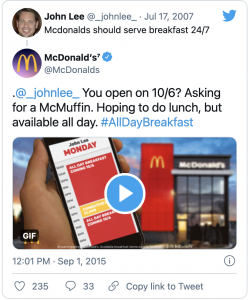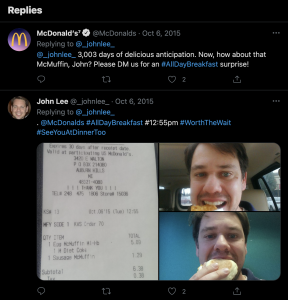Data Ethics In Launching McDonald’s All Day Breakfast
By Daphne Yang | May 28, 2021

Before anyone asks, no. McDonalds all day breakfast isn’t back just quite yet. But as I wait for All Day Breakfast to come back like other McMuffin enthusiasts, I’ve become interested in how and why McDonald’s decided to start all day breakfast. It’s an interesting story especially to dig a little deeper and a fun example to better understand the principles of ethical research set forth by the Belmont Report.
At a Glance: The Belmont Report
To provide protections for future human subjects in healthcare research, the Commission for the Protection of Human Biomedical and Behavioral Research published the Belmont Report in 1979. The report outlined three main principles of ethical research in the wake of the tragic Tuskegee Syphilis study: respect for persons, beneficence, and justice.
-
Respect for Persons
To adhere to the principle of respect for persons, researchers must receive informed and voluntary consent from their subjects and allow them an opportunity to choose what they will allow and not allow to happen to them.
-
Beneficence
Beneficence is generally attributed to acts of kindness. As a principle of ethical research, beneficence requires researches to respect a subjects decisions, to do no harm, and maximize possible benefits while minimizing potential harms.
-
Justice
Justice refers to the equal distribution of benefits and burden to all subjects of a study. This principle works to ensure that ethical research does not disproportionately impact disadvantaged communities and allows each subject an equal share of risk and reward.
The birth of All Day Breakfast isn’t research in the traditional sense so how might these principles apply to the story of McDonald’s All Day Breakfast?
Beginnings of All Day Breakfast

In October 6th, 2015, McDonald’s released on Twitter that their fan favorite breakfast items would be available all day at every one of their 14,000 McDonald’s locations in the United States. The announcement was an ode to the thousands of die-hard and Twitter saavy McDonald’s breakfast fans, especially John Lee, who had championed the idea of all day breakfast as early as 2007.
What Does This Have To Do With Data Ethics?
While it may seem just out of the blue that McDonald’s decided to take John’s advice, this was a data driven and calcuated endeavor by McDonald’s. With the use of Twitter data, McDonald’s researched and studied a small sample of their customer base (334,000 tweets to be exact) to identify All Day Breakfast as the best way to drive customer engagement with their brand and their national franchise stores. Therefore, McDonald’s use of twitter data and study of their customers provides a good enough reason to examine their work through the Belmont Report lens.
Respect For Persons
McDonald’s primarily used a customer experience platform called Sprinklr to conduct their user behavior research. And while the the study was benign in nature, no active consent was sought from the Twitter users from which data was collected. While use of their tweets and data may have received “consent” because of Twitter’s blanket Terms of Service, this doesn’t mean that actual consent was given from the users. Even more so, McDonald’s should have received explicit consent to use John Lee’s original tweet to promote their products.
Grade: C
Beneficence
Beneficence in this case was met by McDonald’s. The aim of their research was to determine the next product to bring to the market and determining what areas of opportunity were best for the brand. And it seems as if McDonald’s did not violate the principle of beneficence in this version of their customer research.
Grade: A
Justice
While the benefits of All Day Breakfast were evenly distributed and accessible to all McDonald’s customers throughout the US (before the sudden halting of the program due to the coronavirus pandemic), it is critical to be cognizant of any potential burdens. In the months following the launch, customers flocked to McDonald’s to have mid-day McGriddles and hotcakes. Was there unequal distribution of benefits between McDonald’s and any subjects? (aka anyone who had interacted or written a tweet about All Day Breakfast). Well in John Lee’s case, there was some benefit for tweeting about all day breakfast all those years ago (shown below). Perhaps that’s a share of the benefit from McDonald’s to their loyal customers but I’d argue he deserved much more for starting the McDonald’s All Day Breakfast trend.

Grade: B
Why Is Any of This Important?
Ethics is such an important part of our lives and data ethics is especially important as our world moves to become more data dependent. Therefore understanding and actively seeing our world through this lens (even through somewhat silly examples) is an important part of being data literate. Hopefully, through this example, the fundamentals of ethics can be understood in a digestible and approachable way.
